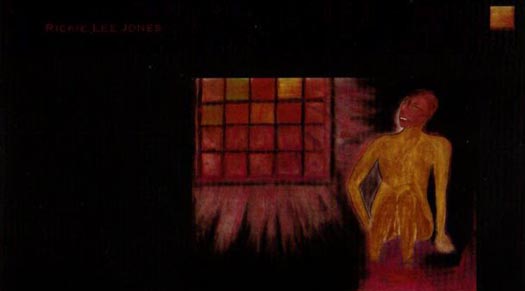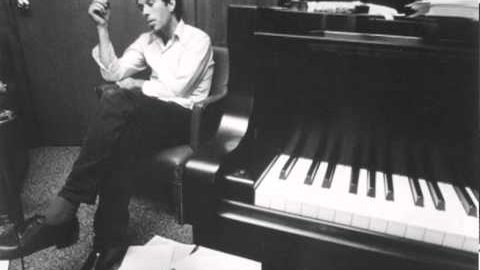
At age 15, a young Rickie Lee Jones dropped out of school and ran away from her Pacific Northwest home in search of her father, an itinerant jazz musician, who had abandoned her family when she was 10 years of age. After spending time living in a barrio in Los Angeles, once on the road again, Rickie Lee finally located her father in Kansas City, Missouri — but didn’t end up staying very long, instead returning to her Puget Sound home, writing her GED, enrolling first at a small college in Tacoma, and afterward, at age 18, moving south to Huntington Beach, California.
Tom Waits’ interpretation of the classic Bernstein/Sondheim song, Somewhere, from the 1961 musical West Side Story, the song on the 1978 Tom Waits album, Blue Valentine.
While in L.A., Rickie Lee played in bars and coffee houses in L.A., and at the age of 21 she began to play in clubs in Venice, sitting in with various jazz bands. Soon after Rickie Lee moved to Venice, where she met local piano player and songwriter Alfred Johnson, the two of them in time setting about to compose the songs Weasel and the White Boys, and Company, both songs later included in Rickie Lee’s eponymous début album.
By 1977, Rickie Lee was playing original material at Hollywood’s Ala Carte Club, when she came to the attention of Tom Waits, who was particularly impressed with her interpretation of a song her father had written, The Moon is Made of Gold. By early 1978, Rickie Lee found herself in the studio where Tom Waits was recording his latest album, Blue Valentine.
Towards the end of the Warner Bros. Blue Valentine recording session, with all the musicians in the room, Rickie was asked if she wanted to record some tracks on the master tape, whereupon she laid down four tracks: Weasel and the White Boys, Company, Easy Money, and The Last Chance Texaco — and thought nothing more of it, until Warner Bros. executive and producer Lenny Waronker was listening to the master tape in his office one day, and was floored when he heard Rickie Lee Jones for the first time.
A year later, in March 1979, Rickie Lee Jones was released and became a hit, buoyed by the chart success of the jazz-flavoured single Chuck E.’s In Love, which hit No. 4 on the Billboard Hot 100. Rickie Lee became an overnight sensation, touring the album across North America and Europe.
I saw Rickie Lee in Vancouver, at The Orpheum, in the summer of 1979.
Rickie Lee followed up her début album with Pirates, considered by many to be her masterpiece, the album returning her to the upper echelons of the charts, along the way garnering a rave five-star review in Rolling Stone.
Long story short, success proved a challenge for Rickie Lee. Behind the scenes, by late 1982 Rickie Lee was struggling with intense addictions, ranging from alcohol, to heroin and cocaine. The authorities were aware of her drug usage, as a Reagan administration set about to make an example of her, and charge and jail her. An oft told tale in the music industry.
Prior to her being charged, Warner Bros. made arrangements to spirit Rickie Lee out of the country, to the south of France — but before leaving, Rickie Lee insisted on recording a 10″ EP, 1983’s jazz-infused Girl At Her Volcano, a virtually unknown album in Rickie Lee’s vast discography, but by far my favourite Rickie Lee recording, and the music which became the soundtrack of my children’s lives in their early, and most formative years.
Lush Life (Girl at Her Volcano), recorded live at L.A.’s Perkins Palace, April 16, 1982
Cobbling together a recording as best they could before spiriting a troubled Rickie Lee out of the country and to safety, the Girl At Her Volcano EP, while highlighting Rickie Lee’s propensity for jazz material, given that the recording is evenly split between classic pop studio and live jazz material actually reveals itself to be a surprisingly cohesive recording.
The studio material, arrangement and production-wise, balances the atmospherics of 1981’s Pirates with the impressionistic, airy tone of The Magazine, which also was to display a return to a more upbeat, joyous jazz-pop style. The lone original is the beautiful two-minute Hey Bub, which, as the liner notes reveal, was the first song written for Pirates in September 1979 but was left off the LP. It’s similar to those lonely, sad, forlorn ballads from the album like Skeletons or The Returns, and similarly gorgeous.
The brief, electric piano-fuelled So Long is a Girl At Her Volcano highlight.
The real highlights of Girl At Her Volcano, though, have to be her sublime live renditions of some notable jazz standards. Rickie Lee’s interpretations of Lush Life and My Funny Valentine breathe new life into familiar material; her emotive vocals and inventive phrasing completely rejuvenate and revitalize the songs. She puts in a passionate vocal performance, certainly, but also a technically superb performance — with dazzling range, precision, and control. Rickie Lee’s voice is not especially big but she wows with her incredible feeling and ability. Those two recordings are from consecutive nights in Pasadena’s Perkins Palace and the LA’s Roxy on April 17-18, 1982, and, along with a September 1979 recording of Something Cool from Amsterdam’s Theater Carre, represent three of Rickie Lee Jones’ career best vocal performances, simply moving and spine-chilling in their intensity.
All of six years of age, when Megan first heard Girl At Her Volcano, and Rickie Lee’s interpretation of Richard Rodgers’ My Funny Valentine — Jude and Megan and I were on our way back home from Seattle, where we’d spent the weekend, as we did once a month throughout the 1980s, and where I’d pick up a cassette of the as-yet-unreleased-in-Canada Girl At Her Volcano EP, late in the day, the night sky dark, clear and purple, Megan sitting nestled in the passenger seat, Jude sound asleep in the back seat, she turned to me and quietly asked, “Daddy, how can someone say …
Your looks are laughable
Unphotographable.Is your figure less than Greek?
Is your mouth a little weak?
When you open it to speak
Are you smart?
“… isn’t Rickie Lee being cruel when she sings those lyrics? Are those the words you use to say to someone you love, that you really love them?”
From that chill 1983 autumn night until this pandemic-infused mid-autumn November, My Funny Valentine remains a Rickie Lee Jones unfavourite song for Megan, however much she loves everything else that Rickie Lee has recorded over the years, the soundtrack of a young girl’s life growing up, and now the mother of three children, living over on Vancouver’s east side.
Have a listen, and see what you think of Rickie Lee’s My Funny Valentine.
